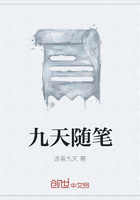This, then, seems the appropriate place for briefly reviewing the vexed question--WAS CHAUCER A WYCLIFFITE? Apart from the character of the "Parson" and from the "Parson's Tale," what is the nature of our evidence on the subject? In the first place, nothing could be clearer than that Chaucer was a very free-spoken critic of the life of the clergy--more especially of the Regular clergy,--of his times. In this character he comes before us from his translation of the "Roman de la Rose" to the "Parson's Tale" itself, where he inveighs with significant earnestness against self indulgence on the part of those who are Religious, or have "entered into Orders, as sub-deacon, or deacon, or priest, or hospitallers." In the "Canterbury Tales," above all, his attacks upon the Friars run nearly the whole gamut of satire, stopping short perhaps before the note of high moral indignation. Moreover, as has been seen, his long connexion with John of Gaunt is a well-established fact; and it has thence been concluded that Chaucer fully shared the opinions and tendencies represented by his patron. In the supposition that Chaucer approved of the countenance for a long time shown by John of Gaunt to Wyclif there is nothing improbable; neither, however, is there anything improbable in this other supposition, that, when the Duke of Lancaster openly washed his hands of the heretical tenets to the utterance of which Wyclif had advanced, Chaucer, together with the large majority of Englishmen, held with the politic duke rather than with the still unflinching Reformer. So long as Wyclif's movement consisted only of an opposition to ecclesiastical pretensions on the one hand, and of an attempt to revive religious sentiment on the other, half the country or more was Wycliffite, and Chaucer no doubt with the rest. But it would require positive evidence to justify the belief that from this feeling Chaucer ever passed to sympathy with LOLLARDRY, in the vague but sufficiently intelligible sense attaching to that term in the latter part of Richard the Second's reign. Richard II himself, whose patronage of Chaucer is certain, in the end attempted rigorously to suppress Lollardry; and Henry IV, the politic John of Gaunt's yet more politic son, to whom Chaucer owed the prosperity enjoyed by him in the last year of his life, became a persecutor almost as soon as he became a king.
Though, then, from the whole tone of his mind, Chaucer could not but sympathise with the opponents of ecclesiastical domination--though, as a man of free and critical spirit, and of an inborn ability for penetrating beneath the surface, he could not but find subjects for endless blame and satire in the members of those Mendicant Orders in whom his chief patron's academical ally had recognised the most formidable obstacles to the spread of pure religion--yet all this would not justify us in regarding him as personally a Wycliffite. Indeed, we might as well at once borrow the phraseology of a recent respectable critic, and set down Dan Chaucer as a Puritan! The policy of his patron tallied with the view which a fresh practical mind such as Chaucer's would naturally be disposed to take of the influence of monks and friars, or at least of those monks and friars whose vices and foibles were specially prominent in his eyes. There are various reasons why men oppose established institutions in the season of their decay; but a fourteenth century satirist of the monks, or even of the clergy at large, was not necessarily a Lollard, any more than a nineteenth century objector to doctors' drugs is necessarily a homoeopathist.
But, it is argued by some, Chaucer has not only assailed the false; he has likewise extolled the true. He has painted both sides of the contrast.
On the one side are the Monk, the Friar, and the rest of their fellows; on the other is the "Poor Parson of a town"--a portrait, if not of Wyclif himself, at all events of a Wycliffite priest; and in the "Tale" or sermon put in the Parson's mouth are recognisable beneath the accumulations of interested editors some of the characteristic marks of Wycliffism. Who is not acquainted with the exquisite portrait in question?--A good man was there of religion, And was a poore Parson of a town.
But rich he was of holy thought and work.
He was also a learned man, a clerk That Christes Gospel truly woulde preach;And his parishioners devoutly teach.
Benign he was, and wondrous diligent, And in adversity full patient.
And such he was y-proved ofte sithes.
Full loth he was to curse men for his tithes;But rather would he give, without doubt, Unto his poor parishioners about Of his off'ring and eke of his substance.
He could in little wealth have suffisance.
Wide was his parish, houses far asunder, Yet failed he not for either rain or thunder In sickness nor mischance to visit all The furthest in his parish, great and small, Upon his feet, and in his hand a staff.
This noble ensample to his sheep he gave, That first he wrought, and afterwards he taught Out of the Gospel he those wordes caught, And this figure he added eke thereto, That "if gold ruste, what shall iron do?"For if a priest be foul, on whom we trust, No wonder is it if a layman rust;And shame it is, if that a priest take keep, A foul shepherd to see and a clean sheep;Well ought a priest ensample for to give By his cleanness, how that his sheep should live.
He put not out his benefice on hire, And left his sheep encumbered in the mire, And ran to London unto Sainte Paul's, To seek himself a chantery for souls, Or maintenance with a brotherhood to hold;But dwelt at home, and kepte well his fold, So that the wolf ne'er made it to miscarry;He was a shepherd and no mercenary.
And though he holy were, and virtuous, He was to sinful man not despitous, And of his speech nor difficult nor digne, But in his teaching discreet and benign.
For to draw folk to heaven by fairness, By good ensample, this was his business:















